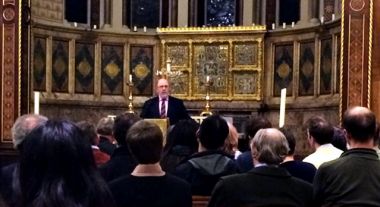New Testament scholar NT Wright on Paul and the faithfulness of God

King's College Chapel in Central London was packed to capacity last night as theologians from a variety of faith backgrounds gathered to hear world renowned New Testament scholar NT Wright speak.
The former Bishop of Durham was launching his eagerly anticipated Paul and the Faithfulness of God books, which have already been widely praised as groundbreaking gamechangers since their launch in October 2013.
The evening was organised by Wright's publishers, SPCK, and forms part of a 5-date tour that will also see Wright visit Durham and Edinburgh next month.
Wright was introduced by the Dean of King's College, the Reverend Professor Richard Burridge and used his 50 minute talk to summarise his 1,600 page volume.
Wright spoke on the four worlds in the time of St Paul - Judaism, Greek philosophy, ancient religion and the Roman Empire. He argued that it was Paul's unique take on each of these worlds that caused riots in the first century, entering a "plural world of many religions" with a "Jewish message of one God".
Moving on to describe part two of his book, Wright looked at the symbols of Paul's worldview. His "provisional conclusion" was "these symbols…the visible tangible thing is the ecclesia (Church), the united and holy community. Unity is easy if you don't care about holiness. Holiness is quite easy if you don't care about community. It's doing the two of them together that's the real trick."

Quoting Romans 12 where Paul talks about a "renewing of the mind", Wright said Paul was not doing theology as an intellectual exercise to organise beliefs but he was teaching churches how to think theologically. "Paul's theology is in the service of enabling the church to be sustained and renewed as a holy and united community."
Wright briefly addressed the topic of Justification – a subject he has debated at length with other scholars and theologians, including well-known American Calvinist pastor John Piper.
"Paul would have agreed with the first century Rabbi who said 'I will make Adam first and if he goes wrong then I'll send Abraham to sort it all out'. In other words the whole Abrahamic story was about this people being called to be the answer to evil…This nomad who is promised a family and the land somehow that's going to be the solution.
"How? Paul says because at last from this man came Israel's representative the Messiah and he has done what that entire narrative is supposed to do. So for justification you need the story of Abraham. There is enormous resistance to this idea in many different theological quarters but I desist."
He continued: "Justification and being in Christ belong together they are mutually defining, they are not different types of theology to be played off against each other…So many theologians have tried to follow Romans 1-4 as though that is the whole thing of justification. Look at Galatians look at the larger picture, especially Romans 5-8 which is still about justification. You need the spirit to make it complete."
After Wright's talk, Dr Edward Adams was invited to give a response to the book. Admitting he had only read 623 of the 1,600 pages, Dr Adams remarked it was the "biggest book on Paul ever written". He praised Wright for an "immensely impressive" book that impressed in scholarship and style but suggested one reservation, that the construction was too "heavily built" on Romans and perhaps "over-privileged" it.
Adams said that Wright had "thoroughly contextualised Paul" and framed the book in terms of first century Jewish categories.
Thirty minutes of questions and answers followed in which Wright admitted to reading reviews of his books on Amazon.
"One of the reviews on Amazon said: 'It was disappointing that Wright didn't take the time to apply this to contemporary issues and so on' and I thought 'how long did you want the book to be?!'"
Rev Burridge concluded the evening with the words: "Tom Wright is a friend, he's a scholar, he's a writer, he's a priest but as it says in Greek in the stained glass windows here, first and foremost he's a slave of Jesus Christ. Tom, thank you for being with us tonight."











